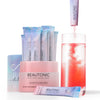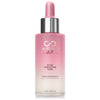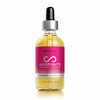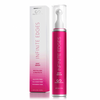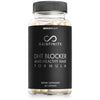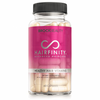
The Antibiotics that Cause Hair Loss and Solution
Several factors can lead to hair loss including your food, lifestyle, environment, and even your medications can cause it. Hair loss can affect your scalp or entire body; it can be temporary or permanent, depending on the cause. One of the causes of hair loss is antibiotics. But then, what are antibiotics?
Antibiotics are antimicrobial elements that have effects on bacteria. It is one of the most common antibacterial agents for combating bacterial infections. These drugs are widely used for killing or inhibiting the growth of bacteria.
There are seven main classes of antibiotics; the penicillins, the Cephalosporins, the Fluoroquinolones, the Macrolides, the Aminoglycosides, the Sulfonamides, and the Oi.
Like any other class of drugs, antibiotics have side effects like stomach upset, diarrhea, vomiting, abdominal pain, vaginal discharge and itching, patches on the tongue, and allergic reactions. A less known side effect of antibiotics is hair loss.
If you've been wondering if antibiotics cause hair loss, we're here to guide you to become aware of the relationship between antibiotics and hair loss. We'll also give you tips to help you recover from hair loss due to the side effects of antibiotics.
Let's begin!
Hair Loss and Antibiotics: What is the Link?
Our hair needs nutrients like Vitamin B, Vitamin C, Vitamin D, Biotin, Vitamin E, Iron, Zinc, and proteins to be healthy and grow properly. For example, Biotin is a B vitamin well known for promoting hair health and enhancing thicker hair growth.
Antibiotics are powerful tools used for fighting bacteria and testing their infections. However, these medications don't work with precision. They attack any bacteria they meet in our body, whether good or bad. However, antibiotics have a noticeable effect on the good bacteria in our digestive system. It makes it difficult for our bodies to synthesize nutrients and vitamins needed by the hair; this can lead to significant hair loss.
Antibiotics have also been linked to a decrease in the level of hemoglobin and Vitamin B. Hemoglobin is responsible for carrying oxygen to all body cells, including hair cells, thereby facilitating the growth of full thick mane. Lack of hemoglobin has been scientifically proven to cause hair loss.
What are the antibiotics that cause hair loss?
There are seven classes of antibiotics, and there are many examples under these classes.
The common antibiotics that cause hair loss are erythromycin, penicillin, cefpodoxime, cephalexin, and clindamycin. Let's see how each of these affects the growth of healthy hair;
-
Erythromycin
This antibiotic is commonly prescribed to treat bacterial infections such as skin infections, ear infections, intestinal amebiasis, diphtheria, and pelvic inflammatory diseases.
These drugs have mild side effects like; diarrhea and vomiting. At the same time, its severe side effects include palpitations, chest pain, liver problems, and hair loss.
However, patients reported hair loss due to using erythromycin for a long time. It also causes bluish discoloration of the skin.
-
Penicillin
The Penicillin (PCN) group includes procaine, penicillin G, penicillin V, and benzathine penicillin. It is the first antibiotic discovered, and it's widely used to treat many bacterial infections. However, so many bacteria have developed resistance to the drug over time.
Nonetheless, penicillin has many side effects ranging from common ones like nausea, diarrhea, and vomiting to severe ones like seizures, skin rash, and hair loss.
Despite being a revolutionary antibiotic that treats a wide range of diseases, continuous usage of this drug has been linked to hair loss in some patients.
-
Cefpodoxime
It treats bacterial infections like bronchitis, pneumonia, and gonorrhea. It's also effective in treating skin, ear, sinuses, throat, tonsil, and urinary tract infections.
Its side effects include blurred vision and a bloody nose. Excess use of this drug has been linked to significant hair loss in patients.
-
Cephalexin
This is another popular antibiotic that's widely used in treating bacterial infections like respiratory, skin, and urinary tract infections. Its typical side effects include diarrhea, dizziness, and headache. Severe side effects include bleeding, jaundice, and hair loss.
This medication leads to hair loss indirectly. Since it causes diarrhea sometimes, which leads to a lack of fluid, this will, in turn, leads to depletion of essential hair nutrient in hair follicles resulting in fragile hair strands that shed out quickly.
-
Clindamycin
It mostly comes in topical solutions and oral capsules. This generic drug is mainly used in treating sinus infections and middle ear infections caused by bacteria.
Although an effective antibiotic, clindamycin has several side effects, including rashes, blisters, pruritus, skin discoloration, hair loss, and other scalp-related disorders.
Many antibiotics trigger hair loss, but the ones above have been scientifically proven to trigger hair loss in both men and women.
Other Ways Antibiotics Can Cause Hair Loss
Apart from indirectly, there's another reason why antibiotics cause hair loss. This is by altering the hair growth cycle.
This cycle comprises three phases; the anagen, catagen, and telogen phases. The anagen is the growth phase which lasts between two to six years. Catagen is the transition stage, while telogen is the resting phase that lasts for three to six months.
Continuous use of antibiotics can trigger a process known as telogen effluvium, which makes hair follicles begin the resting phase earlier than they are. This leads to excessive hair shedding resulting in hair loss.
Hair loss doesn't occur overnight. It occurs 3 to 6 months after antibiotics have been introduced, then the hair follicles go into an abrupt telecon phase. This period of rest will cause excessive shedding and hair fall out.
How Do I Know If My Hair Loss Is Caused By Antibiotics?
Most times, it's difficult to pinpoint if the use of antibiotics is the actual cause of your hair loss.
Antibiotic manufacturers don't usually list hair loss as one of its effects. That's why it's hard to pinpoint whether your hair loss is caused by continuous use of these medications.
While some common side effects such as vomiting and diarrhea are mentioned on the labels, severe ones like hair loss are often not included. That includes even the most often used antibiotics and the ones that have been clinically proven to cause hair loss, like penicillin, erythromycin, and cephalexin.
Not everyone taking antibiotics will experience hair loss, but it would be wise to consult a doctor if you do experience any hair loss while using them.
Will Hair Loss as a Side Effect of Antibiotics Grow Back?
The big question is if I lose my hair due to the intake of antibiotics will it grow back? The good news is hair loss caused by antibiotics and over medications is temporary primarily rather than permanent.
This means that hair loss caused by antibiotics will cease once a person stops taking the medications. However, it would help if you talked to your doctor before you stopped taking antibiotics.
The hair regrowth period is mostly 3-6 months, but it varies from person to person.
How to Reverse Hair Loss Caused by Antibiotics
Hair loss caused by antibiotics ceases once a person stops taking antibiotics. However, it very essential you talk to a health care provider before you stop taking your medications.
When you stop taking the medications, it will take 3-6 months for your hair to grow back. However, there are some natural home solutions and remedies that can be used to hasten hair growth.
-
Nutritious diet and supplements
Eating a nutritious, balanced diet helps provide your hair with the required nutrients. A diet containing proteins, antioxidants, omega three fatty acids, and omega-six fatty acids is also perfect for the growth of healthy hair.
According to Medical News Today, a study in 2015 looked at the effects of omega-3-fatty-acids and omega-6-fatty-acids and antioxidant supplements on the growth of healthy hair in females.
After six months, it was found that 90% of the subjects experienced increased thickness of hair and reduced hair loss. Deficiency in specific nutrients like zinc, iron, and vitamins can also affect hair growth.
An excellent way to make sure you're getting all the vitamins and nutrients that you need to grow healthier, stronger hair is by taking a multi-vitamin specifically formulated to promote hair growth, like HAIRFINITY Healthy Hair Vitamins.
Working in tandem with your Hairfinity hair care, a daily dose of Hairfinity Healthy Hair Vitamins provides:
- Vitamins A and D promote healthy hair and scalp.
- Niacin promotes healthy blood circulation to the scalp.
- Pantothenic Acid for stronger hair follicles.
- Vitamin B12 to oxygenate scalp and hair follicles.
- Biotin supports existing hair growth, keratin production, and increases hair elasticity.
-
Minoxidil:
Minoxidil is a topical medication initially developed as an oral medication for high blood pressure and hair loss. This medication encourages healthy hair growth by strengthening the strands and stimulating the hair follicles.
The medication promotes hair growth by increasing blood flow to the hair by dilating blood vessels in the scalp. A study also shows that minoxidil increases the amount of ATP in the hair follicles, which extends its anagen or growth phase. It can be used for reversing hair loss caused by antibiotics.
It also opens and enlarges hair follicles that have shrunken and died due to hormonal changes and harsh hair products.
Minoxidil is safe for both natural and color-treated hair. However, those with treated hair might experience slight irritations. Hair density, however, starts to increase after two to three months of usage, and the number of hair strands sheds per day also decreases.
The over-the-counter medication is applied to the scalp after damping the hair. However, it's advisable to talk to your pharmacist when purchasing minoxidil.
-
Scalp Massage
Practicing scalp massage, which can be done with certain hair oils and masks, can help reverse hair loss caused by antibiotics.
Stretching during scalp massaging facilitates the growth of thick and full hair in the cells located at the bottom of the hair follicles. These cells play a vital role in forming hair, its growth, and shedding.
Scalp massage also improves blood flow in the hair follicles, thereby improving the overall health of the scalp.
Taking 5 minutes out of your daily schedule to massage your scalp will help reverse hair loss caused by antibiotics, stress, and anxiety.
Use your fingertips, not fingernails, to massage your scalp. Apply low to medium pressure and move in circles across your scalp.
-
Coconut Oil
Coconut oil is rich in Lauric acid, a form of fatty acid that enters the hair shaft and reduces protein loss from the hair. It also enriches the scalp microbiome, making the hair follicles healthier and more viable.
Coconut oil is an excellent solution to hair loss caused by antibiotics. It can be applied before or after you wash your hair, depending on your hair type. If you have oily hair, it's advisable to do the treatment overnight or hours before washing your hair.
Gently massage the coconut oil into your scalp and your hair strands. If you've dry hair, you can leave it as a leave-in treatment, while if you've oily hair, you can wash your hair afterward.
There's little evidence showing that coconut hair promotes the growth of hair, but it has been shown to prevent breakage and strengthen hair shafts.
-
Rosemary Oil
Another effective way of reversing hair loss caused by antibiotics is using rosemary oil. Studies have shown that the oil is used to stimulate hair growth and helps in treating androgenetic alopecia.
Many have used the oil to reduce hair loss and promote hair growth, and the result was a success. Mix the oil with a carrier oil like jojoba or argan oil and massage it into your scalp and hair, then rinse after some minutes. You can do this 3 to 4 times a week.
You can also add a few drops of the essential oil into your shampoo or conditioner. Avoid applying essential oils directly into your hair as they can irritate. Always mix them with a carrier oil, shampoo, or conditioner.
-
Viviscal
Viviscal is a natural hair growth supplement that effectively treats hair loss. It improves the thickness and appearance of hair exposed to excessive fallout due to antibiotics and other hair loss factors.
Though not approved by FDA, the website of the brand claimed they've met all the requirements of the FDA. The supplement contains AminoMac C, a marine complex rich in mollusk powder, organic silica, shark, and vitamin C. These ingredients strengthen hair cells, thereby promoting hair growth.
Viviscal supplement comes in the form of a tablet to be taken twice for at least six months. The brand also makes shampoos and conditioners.
Conclusion
If you're experiencing hair loss and you suspect antibiotics cause it, talk to your doctor immediately for alternative treatment options.
Antibiotics don't cause permanent hair loss; time, a balanced diet, and supplements will return your hair to its average thickness.

















